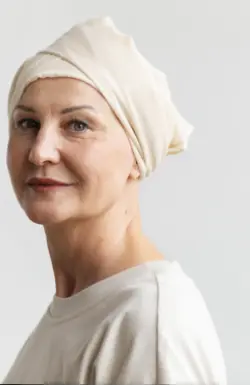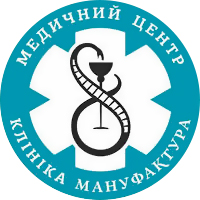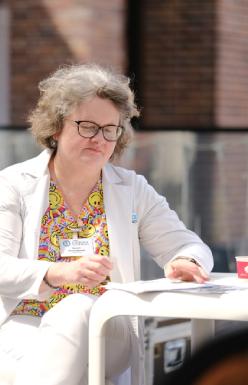
How chemotherapy affects the body
For a number of cells in our body, constant cell division and growth is a natural process. These include bone marrow cells, hair follicles, and cells of the gastrointestinal tract.
For cells whose division and growth are not initiated by nature, such a process is pathological, leading to the formation of a tumor and dysfunction of an organ or system.
The chemotherapy treatment is to intervene in the process of cell division. Most chemotherapeutic drugs do not distinguish between cells with pathological division and cells whose division is a constant natural process. Chemotherapy is equally destructive to all dividing cells.
Side effects of chemotherapy, such as: a decrease in the level of hemoglobin, nausea and vomiting, diarrhea, hair loss, sores on the oral mucosa - are the consequences of damage by medical drugs to cells that are naturally designed to divide. With the end of the treatment, healthy cells are restored and the effects of drug damage to healthy cells disappear.
The intensity of the side reaction to the same medicine in the same dosage is very individual. For one patient, it can be severe nausea with vomiting, for another, a heartburn, and the third patient will feel nothing.
The absence of an adverse reaction to chemotherapy does not mean the absence of a therapeutic effect, however. Just as the intensity of the adverse reaction does not indicate the effectiveness of the treatment. The effectiveness of treatment is evaluated on the basis of control diagnostic measurements. And the side reaction of the body indicates the individual tolerance of the medicine only.
Any unpleasant feelings, physiological manifestation and sickness during chemotherapy should receive appropriate medication correction, so be sure to inform the attending physician about the appearance of an adverse reaction.
Indigestion during chemotherapy
An unpleasant taste in the mouth, nausea, vomiting are the most frequent side reactions to chemotherapy. Nausea and unpleasant taste will be relieved by simple remedies - lollipop, lemon, apple juice, Coca-Cola, and on the day of the therapy - a light diet. Vomiting requires medical treatment. As a rule, when prescribing a course of chemistry, the doctor writes a prescription for antiemetics and antinausea agents. Be sure to tell the doctor if the prescribed medicine does not stop the vomiting, the doctor will choose others.
Diarrhea will require adherence to a diet, and in the absence of effect - medication. If the chemotherapy medicine causes diarrhea, then on the day of the next course, it is recommended to give up foods that increase gas formation, limit or give up dairy products, instead, eat rice, fish, bananas, pasta, and eat hot foods. When receiving chemotherapy courses, it is important to drink a lot (10-12 glasses of caffeine-free drinks). Diarrhea and vomiting require special attention to the amount of water consumption in order to replenish its losses in the body.
Constipation. If the body reacts to chemotherapy with constipation, it is necessary to change the diet on the day of the next course of therapy. It is recommended to eat food rich in fiber, primarily vegetables, as well as fruits, coarse bread, and nuts. Constipation that lasts more than three days requires the use of laxatives.
Dryness in the mouth and throat is relieved by cold soft food - ice cream, puddings, fruit, it is important to drink a lot and rinse the mouth. Dry mouth is a discomfort that does not have a special therapy, and does not lead to a deterioration of the patient's health.
Mouth sores are the result of damage to the mucous membrane. It is necessary to refrain from foods and drinks that increase the irritation of the mucous membrane and worsen its condition. Be sure to protect the oral cavity from injuries with a toothbrush and to take additional hygienic measures - antiseptic rinses, smooth brushing teeth every time after eating.
Changes in blood parameters during chemotherapy
All blood cells are produced by the bone marrow, they develop rapidly and are therefore negatively affected by chemotherapy.
A decrease in leukocytes, the white blood cells that fight inflammatory processes in the body, can lead to the development of inflammation in the body. This is manifested by fever (38°C and above), possible cough, sore throat, the pustular rashes on the skin or mucous membranes, burning during urination, etc.
A decrease in platelets, the cells responsible for blood clotting and wound healing, can manifest as bruising on the body, bleeding from the nose or gums, and the appearance of blood in the urine or feces.
A decrease in erythrocytes, the red blood cells that supply oxygen to organ tissues, leads to anemia. Its symptoms: fatigue, weakness, dizziness, palpitations, shortness of breath, hunger.
Before each course of chemotherapy, the doctor prescribes a blood test to control its indicators, but if even one of the listed symptoms appears during treatment, notify the doctor to prescribe corrective therapy.
Skin and hair damage because of chemotherapy
Not all chemotherapy medications cause hair loss. When prescribing drugs that affect hair follicles, the doctor warns the patient. It is not possible to prevent hair loss, but it is a reversible process, and after the course is finished, the hair grows back.
Medicines administered through veins cause skin irritation at the injection area. It manifests with a rash, redness, darkening of the skin. Topical emollient creams often help reduce the effects of medications on the skin.
Treatment may cause darkening of the skin of the hands and face. There are medications that cause a change in skin color under the influence of the sun, so tanning is contraindicated. The change in skin color is also reversible and after the treatment is discontinued, the healthy condition and color of the skin will be restored.
The impact of chemotherapy to the reproductive system functioning
Changes in the cycle are possible in women. Menstruation may stop or become irregular. In young women, after canceling the course of chemotherapy, the cycle resumes, in women of transitional age, premature menopause may begin. It is important to remember that even in the absence of menstruation, it is possible to get pregnant. Chemotherapy has a detrimental effect on the fetus, so pregnancy should be avoided while receiving therapy. If a woman takes birth control pills, it is necessary to inform the doctor, because in some cases taking such pills is contraindicated. When planning a pregnancy after treatment, it is necessary to consult a doctor about the possible dates for the beginning of pregnancy and the characteristics of carrying a child.
Chemotherapy reduces sperm count in men, but does not affect intercourse. There are cases when chemotherapy leads to infertility in men, but mostly the ability to conceive is restored after treatment. It is recommended to save sperm before starting chemotherapy. Couples are advised to avoid pregnancy while the husband is receiving chemotherapy.
Remember:
- Notify doctor about any side effects that occur. The doctor knows how to alleviate the condition and reduce the reaction to medications.
- Immediately notify the doctor if one of the listed symptoms appears: body temperature above 38 °C, skin rash, bleeding, severe pain, diarrhea more than 6 times a day, vomiting for 24 hours or more, difficulty breathing. Intense body changes as a result of an adverse reaction require medical correction of the patient's condition.
- Follow the drinking regime. It is important to remove the breakdown products of medicines and toxic substances from the body.
- Adverse reactions to chemotherapy disappear after its completion.
Make an appointment
Your name
Phone number
Direction
Desired date
Comment













